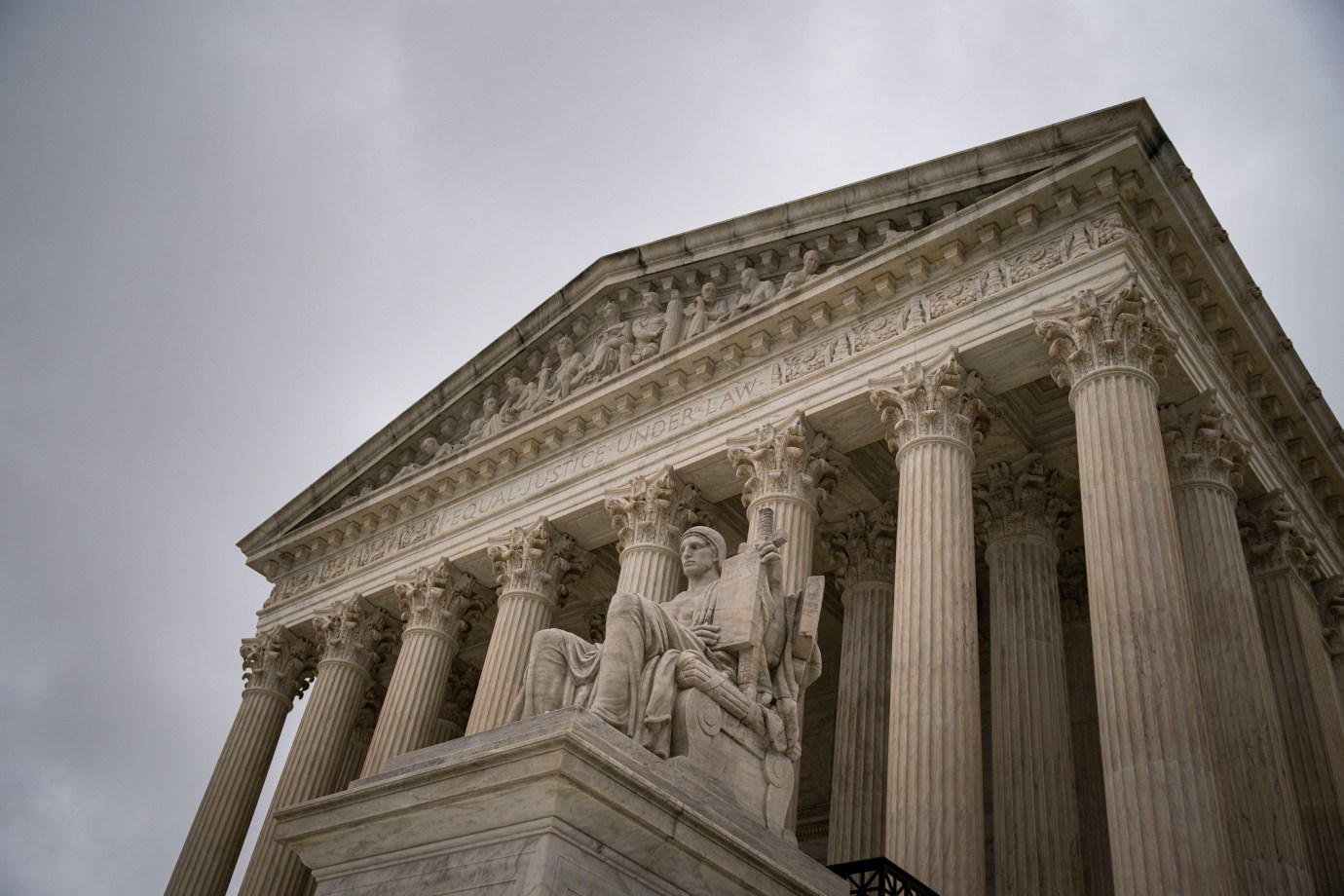Happy Monday! A man who snuck onto the roof of the Westfalenstadion stadium during a Germany-Denmark soccer game this weekend claimed he simply wanted “to take good photos.”
So that’s why he was dressed in black and wearing a mask to hide his identity!
Quick Hits: Today’s Top Stories
- President Joe Biden and his campaign maintained over the weekend that the 81-year-old commander-in-chief is still capable of challenging former President Donald Trump in November’s election after many of the president’s allies expressed concern following last week’s debate performance. “I get it. I didn’t have a great night [during the debate],” Biden said Saturday at a fundraiser. “But I’m going to be fighting harder.” A growing number of prominent Democratic-adjacent media figures and institutions—including Jon Favreau, Ezra Klein, Thomas Friedman, David Remnick, and the New York Times editorial board—have now called on Biden to step aside, but few Democratic lawmakers have publicly said the same. Several party leaders—including Barack Obama, Bill Clinton, Nancy Pelosi, and Jim Clyburn—acknowledged Biden’s poor performance over the weekend but nevertheless pushed back on the notion he would or should be replaced. A CBS News poll conducted after last week’s debate and published Sunday found that 72 percent of registered voters believe Biden does not have the “mental and cognitive health” to serve as president, and that 72 percent of those same voters—including 46 percent of Democratic voters—believe Biden not continue his 2024 campaign.
- In a 6-3 decision along ideological lines in Loper Bright Enterprises v. Raimondo, the Supreme Court on Friday overturned the Chevron doctrine, which showed deference to federal agencies adopting their own interpretation of an ambiguous law so long as it was “reasonable” and “permissible.” Chief Justice John Roberts, writing for the majority, called the original Chevron decision “fundamentally misguided.” Meanwhile, the court—in another 6-3 decision on ideological lines—upheld a local Oregon town statute that allowed the municipality to criminalize sleeping outside within city limits with boxes, blankets, or pillows for protection, holding that the ordinance is not a violation of the Eighth Amendment’s prohibition on “cruel and unusual punishment.”
- In Fischer v. United States, also released on Friday, the Supreme Court ruled—in a 6-3 decision that saw Justice Ketanji Brown Jackson join an otherwise conservative majority and Justice Amy Coney Barret join Justices Elena Kagan and Sonia Sotomayor in the dissent—that charging an alleged rioter in the January 6 attack on the Capitol with a federal obstruction charge was an overinterpretation of the law. The Justice Department clarified Friday that the decision will not deter the agency from prosecuting January 6 defendants on other offenses. “The vast majority of the more than 1,400 defendants charged for their illegal actions on January 6 will not be affected by this decision,” U.S. Attorney General Merrick Garland said in a statement Friday. “There are no cases in which the Department charged a January 6 defendant only with the offense at issue in Fischer.”
- A Russian missile strike on Sunday in the southeastern Ukrainian town of Vilniansk killed at least 11 civilians—including two children—and left dozens of others injured. Russian warplanes also bombed civilian facilities in Kharkiv, Ukraine, on Saturday, though no casualties have been reported. Shortly after the Saturday attack, Ukrainian President Volodymyr Zelensky emphasized the need for permission to use U.S. long-range missiles to attack Russian military targets in Russia. “The sooner the world helps us deal with the Russian combat aircraft launching these bombs, the sooner we can strike—justifiably strike—at Russian military infrastructure, military airfields, the closer we will be to peace,” Zelensky said Saturday.
- Israeli Prime Minister Benjamin Netanyahu reiterated his commitment on Sunday to fighting Hamas until the terrorist organization is eliminated, all remaining hostages held in Gaza are returned, and Gaza no longer poses a serious threat to the state of Israel. “To whoever doubts the achieving of these goals, I reiterate: There is no substitute for victory,” Netanyahu said. “We will not end the war until we achieve all of these goals.” Meanwhile, Biden administration negotiators reportedly reworded parts of its proposed Israel-Hamas ceasefire deal in hopes it would compel both sides towards an agreement—a three-phase plan that would secure the release of the remaining hostages to eventually secure a long-term ceasefire.
- A series of suicide bombings in northeastern Nigeria on Saturday afternoon left at least 18 people dead and dozens more injured. The attackers were reportedly three women who separately targeted a wedding, a funeral, and a hospital. While no organization has yet claimed responsibility for the attack, the region has been ravaged in recent years by Boko Haram, a jihadist terror group.
- Marine Le Pen’s National Rally party looked set to make significant gains in the first round of French parliamentary elections on Sunday, according to exit polls, potentially becoming the largest party in the French National Assembly and marking a defeat for French President Emmanuel Macron, who called the election to forestall a far-right victory. An alliance of left-wing parties followed the National Rally, and Macron’s Together parliamentary alliance seemed likely to be the third largest grouping—though none of the party alliances seemed to have achieved an outright majority of seats on Sunday. There will be a second-round vote next Sunday in districts where candidates did not receive a majority of the votes yesterday, which could produce a parliamentary majority for Le Pen’s party and allow it to form a government.
- NASA announced Friday that two astronauts—Barry “Butch” Wilmore and Sunita Williams—will see their stay at the International Space Station (ISS) extended further as engineers continue to test the safety of Boeing’s Starliner spacecraft. The astronauts arrived at the ISS on Starliner’s first crewed voyage earlier this month and were expected to return roughly a week after arrival. However, while docking, Starliner experienced helium leaks and thruster problems, delaying the return to Earth. NASA has yet to schedule an official return date for Starliner and the two astronauts.
A MESSAGE FROM APCIA
A Mysterious Factor Impacting Insurance Costs
Learn how third-party litigation funding raises costs for American families and businesses. Did you know that lenders, foreign as well as domestic, secretly invest in lawsuits aiming for a cut of an award?
SCOTUS Sets Limits on Executive Power

The Supreme Court called our bluff. Last week, we wrote to you that, “if the justices push the season into July, you may find your TMD team protesting the schedule on the steps of the Supreme Court.”
The term has indeed extended into July, and needless to say, we’re not pacing in front of the Supreme Court wearing a sandwich board.
A July hand-down day is a rarity for Supreme Court justices, who release decisions as they come to them and have almost always exhausted their list of pending cases by the end of June. But just because they ran out of time last week doesn’t mean they weren’t busy.
Indeed, the high court released some of its most consequential decisions of the term on Wednesday, Thursday, and Friday—overturning 40 years of precedent around judicial deference to executive agencies and ruling on such hot-button issues as abortion policy, social media censorship, and the legality of some elements of the January 6 prosecutions. Though the court is charting a slightly more ideological path in this term than the last, it has nonetheless avoided the kind of rulings that would send shockwaves through the country and frequently moved decision-making power back to its constitutionally mandated home.
In one of the most anticipated cases of the term, the Supreme Court on Friday overturned the so-called …
As a non-paying reader, you are receiving a truncated version of The Morning Dispatch. Our full 1,927-word story on the latest Supreme Court decisions is available in the members-only version of TMD.
Worth Your Time
- Politico’s Ryan Lizza sat down with Utah Gov. Spencer Cox—a rare Trump-skeptical Republican who has continued to win elections. “I think it’s fascinating that now we hear words like ‘respect’ and we assume moderation; that conservatism is the same as treating people with disrespect or anger or hate,” Cox said. “That’s fairly new in our lexicon. It’s never been like that before, that we’re cross-associating those things.” On the topic of the upcoming presidential election, Cox did not shy away from the bipartisan age problem. “We all have family members. We see what happens when you get over 80. I don’t think that people over 80 should be running a country. I think that’s a huge mistake. I can’t believe we ended up with these two candidates again.” But despite the gloom, Cox rejected the doom. “Look, Trump was president before—we made it. A lot of people said we couldn’t survive four years of Joe Biden, and here we are. Hasn’t been great. But at the end of the day, we’re resilient people. And we will get through the next four years.”
- In a piece for National Review, Luca Gattoni-Celli argued that the YIMBY (“Yes, In My Backyard”) housing movement is conservative. “Our loudest detractors are antisocial Marxists,” he wrote. “Their chief complaint is that some YIMBYs are conservative. … The truth is, YIMBY is not partisan, and urbanism does not require any notable ideological commitments. However, the YIMBY policy agenda boils down to deregulation. And our vision for neighborhoods with tight communities, abundant starter homes, and thriving young families is small-c conservative, a return to traditional American land use.” What are some policy examples? “The zoning restriction that conservatives should object to most is minimum lot size, which make starter homes financially infeasible for many. Land is expensive, so large lots incentivize relatively larger and more profitable houses. … Conservatives should also be leading the charge against often Kafkaesque permitting. My city’s permitting office performed some kind of archeological review before I could remodel my townhouse’s third-floor bathroom,” he wrote. “The YIMBY movement is an attempt to rebuild the American dream of a comfortable middle-class existence with a stable family life and good friends. I could call that aspiration many things, yet the first term that comes to my mind is ‘conservative.’”
Presented Without Comment
CNN: Democrats Fear Replacement Scenarios as Much as Keeping Biden
A debate watch party in Los Angeles on Thursday night happened to feature [Kamala] Harris’ husband Doug Emhoff, [J.B.] Pritzker, [Gretchen] Whitmer, and [Andy] Beshear. There were other high-profile attendees—by a few answers in, Rob Reiner was screaming about losing and Jane Fonda had tears in her eyes, according to people in the room.
Also Presented Without Comment
Politico: [Steve] Bannon Rejects Idea of ‘Retribution’ But Lists Trump Foes to be Investigated
Also Also Presented Without Comment
Bloomberg: U.S. Dismantles Gaza Pier With No Prospect of Bringing It Back
In the Zeitgeist
British bicyclist Mark Cavendish already has many kudos for his bicycling career: He was named “the greatest sprinter in the history of the Tour [de France] and of cycling” by the bicycling marathon’s director in 2021, and, earlier this month, he was knighted in the United Kingdom.
At 39 years old, most bicyclists would be nearing the finish line of their professional bicycling marathon careers. But Cavendish is chasing one final victory in the 2024 Tour de France—which began Saturday. He had a rough stage one of the race and didn’t clinch it in stage 2, but if he wins just one more stage—his 35th—he would rank number one of all time, surpassing renowned Belgian cyclist Eddy Merckx, with whom he is currently tied.
Toeing the Company Line
- In the newsletters: the Dispatch Politics crew reported on the aftermath of debate night, Nick compared Biden’s debate performance to a classic horror film, Jonah observed that Biden allies can no longer deny the president’s age problem, Chris explored (🔒) the complex process of nominating a candidate other than Biden at the Democratic National Convention, and for Dispatch Faith, Terry Mattingly argued in favor of religious reporting.
- On the podcasts: Sarah was joined by Kevin, Steve, and Megan McArdle to break down Joe Biden’s hard-to-watch debate performance on the Dispatch Podcast roundtable, Sarah and David explained the latest Supreme Court decisions—including the death of the Chevron doctrine—on Advisory Opinions, Jonah ruminated late at night on the solo Remnant, and Victoria interviewed Richard Reeves, president of the American Institute for Boys and Men, on The Skiff (🔒). On today’s episode of The Dispatch Podcast, Jamie interviews former Hillary Clinton aide Philippe Reines about the state of Democratic politics after Thursday’s disastrous debate.
- On the site over the weekend: Alex fact-checked the Trump-Biden debate, Stephanie Murray highlighted the peculiar absence of smartphones and social media from Inside Out 2, and Ben Rolsma reviewed Yuval Levin’s new book, American Covenant.
- On the site today: Ilya Somin explains why he believes nationalism poses a greater threat than wokeism, Tom Joscelyn analyzes Julian Assange’s 2016 election interference in light of his recent plea deal, and John examines the Supreme Court’s ruling on the Emergency Medical Treatment and Active Labor Act and Idaho’s abortion restriction.











Please note that we at The Dispatch hold ourselves, our work, and our commenters to a higher standard than other places on the internet. We welcome comments that foster genuine debate or discussion—including comments critical of us or our work—but responses that include ad hominem attacks on fellow Dispatch members or are intended to stoke fear and anger may be moderated.
With your membership, you only have the ability to comment on The Morning Dispatch articles. Consider upgrading to join the conversation everywhere.